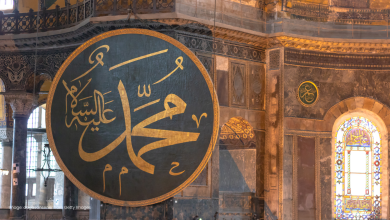
Prophet Muhammad (S.A.W.) has always been an exemplary leader for all of mankind. Admired by many, he displayed remarkable traits that are difficult for most to embody. One of his most notable qualities was his deep capacity for love.
He is often described as the epitome of compassion, mercy, and love. His life is filled with countless examples of kindness and empathy—toward his family, his followers, strangers, and even animals. His acts of kindness weren’t limited to those he loved; he also extended mercy and compassion to his enemies.
Throughout his life, Prophet Muhammad (S.A.W.) faced numerous challenges and hardships. In the face of adversity, how did he manage his emotions and maintain his leadership?
He is strict but remains soft and compassionate to others
The Prophet Muhammad (ﷺ) was strict when it came to matters of justice and principles. However, he was still soft and compassionate—even toward his enemies. For instance, Abu Sufyan is one of the Prophet’s fiercest enemies who is trying to kill Prophet S.A.W. The Prophet (ﷺ) did not take revenge. Instead, he forgave, granted him protection, and allowed him to join the Muslims, later embracing Islam. He was even given a position as a leader for the benefit of a higher purpose.
It was narrated from Abu Hurairah that the Messenger of Allah (ﷺ) said:
“I have been commanded to fight the people until they say: La ilaha illallah. If they say it, then their blood and wealth are protected from me, except for a right that is due from it, and their reckoning will be with Allah.” (Sunan Ibn Majah 3927)
His leadership was always oriented towards reconciliation, peace, and spiritual protection rather than war for the sake of war.
He acknowledges emotions
Prophet Muhammad ﷺ did acknowledge his emotions, particularly in the aftermath of the traumatic events in Ta’if. In the incident of Ta’if, despite facing the vilest rejection and physical harm, he ﷺ expressed the emotional distress he experienced. When ‘A’ishah, his wife, ا asked him if any day had been more difficult than the day of Uhud, he ﷺ responded that the day of ‘Aqabah, during the incident at Ta’if, was more difficult.
Prophet Muhammad (ﷺ) replied, “Your tribes have troubled me a lot, and the worst trouble was the trouble on the day of ‘Aqaba when I presented myself to Ibn Abd-Yalail bin Abd-Kulal, and he did not respond to my demand. So I departed, overwhelmed with excessive sorrow, and proceeded on, but I could not relax till I found myself at Qarnath-Tha-alib. (Sahih al-Bukhari 3231)
He acknowledged and experienced emotional pain, not as a sign of weakness but as part of his human experience. Despite the suffering, he did not complain or seek sympathy. Instead, he found a place to calm down himself and reserved his deepest grievances for Allah, as shown in his prayer to Allah for mercy and support.
He practices self-control
According to the Prophet ﷺ, the real strength lies not in one’s physical ability to fight or wrestle but in the self-control one exercises over their emotions, particularly anger. This is because self-control reflects a deep level of intellectual maturity. It involves conscious decision-making, where one chooses not to give in to negative emotions, thus avoiding harmful actions and maintaining peace of mind and harmony with others.
Abu Hurairah (RAA) narrated that Allah’s Messenger (ﷺ) said:
“The strong man is not the good wrestler, but the strong man is he who controls himself when he is angry.” (Book 16, Hadith 45)
This shows real strength lies in the ability to manage one’s emotions, which leads to healthier relationships and a more peaceful life.
Conclusions
Prophet Muhammad (S.A.W.) is an excellent example of how to manage emotions while being a strong leader. He showed that it’s possible to be strict about what is right while still being kind and forgiving, even to those who opposed him. His ability to feel and express emotions during difficult times, like after the tough experience in Ta’if, reminds us that it’s okay to show vulnerability.
This doesn’t make us weak; instead, it helps us connect with others. Additionally, his focus on self-control teaches us that true strength comes from managing our emotions, especially anger. Overall, Prophet Muhammad’s (S.A.W.) life encourages us to be compassionate, understanding, and emotionally intelligent in our own leadership and daily interactions.




